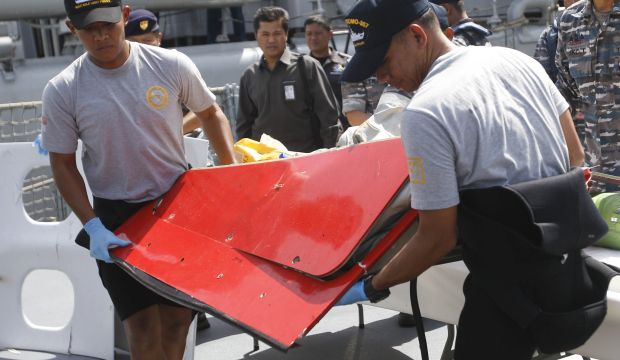
Crew members of Indonesian Navy ship KRI Bung Tomo carry a piece of the airplane part from AirAsia Flight 8501 recovered in search operations for the ill-fated jetliner, during a press conference at the Navy’s Eastern Fleet Naval Base in Surabaya, East Java, Indonesia, on January 5, 2015. (AP Photo/Trisnadi)
Ships and aircraft seeking debris and bodies from the Airbus A320-200 widened their search area to allow for currents eight days after Flight QZ8501 plunged into the water en route from Indonesia’s second-biggest city Surabaya to Singapore with 162 people on board.
“We found what has a high probability of being the tail of the plane,” Yayan Sofyan, captain of the patrol vessel, told reporters. However, the Indonesian search and rescue agency is yet to confirm the discovery.
Indonesia’s meteorological agency has said seasonal tropical storms probably contributed to the December 28 crash and the weather has persistently hampered efforts to recover bodies and find the cockpit voice and flight data recorders that should explain why the plane crashed into the sea.
The main focus of the search is about 90 nautical miles off the coast of Borneo island, where five large objects believed to be parts of the plane—the largest about 59 feet (18 meters) long—have been pinpointed in shallow waters by ships using sonar.
Peter Marosszeky, a senior aviation research fellow at the University of New South Wales in Sydney, said the weather was squarely to blame for the delay in finding the black box recorders, which are designed to emit pings that can be detected by sonar for a month after a crash.
“The seas haven’t been very friendly, but the black boxes have a 30-day life and they will be able to find them, particularly in the shallow waters,” he said. “It’s the weather that is causing the delay.”
Indonesia AirAsia, which is 49 percent owned by Malaysia-based budget carrier AirAsia, has come under pressure from authorities who have suspended its Surabaya–Singapore licence, saying the carrier only had permission to fly the route on Mondays, Tuesdays, Thursdays and Saturdays. Flight QZ8501 took off on a Sunday.
It was not immediately clear what difference, if any, the day of the week had on the December 28 flight, and Djoko Murjatmodjo, acting director general of air transportation, made clear that the investigations of the route and the crash were separate.
“Please differentiate between the probe into flight licenses and the air crash investigation,” he said, adding, however, that any other airline that flew on a day it did not have permission to do so would have its licence frozen.
“AirAsia is clearly wrong because they didn’t fly at a time and schedule that was already determined,” Murjatmodjo told reporters. “We hope to finish [the] investigation soon on whether anything went wrong.”
A joint statement from Singapore’s civil aviation authority and Changi Airport Group said that AirAsia had the necessary approvals to operate a daily flight between Surabaya and Singapore.
Nine ships from four countries have converged on the crash site area, with teams of divers including seven Russian experts standing ready, but strong winds and 4-meter high waves have kept progress agonizingly slow.
Thirty-four bodies of the mostly Indonesian passengers and crew have so far been recovered, including some still strapped in their seats. Many more may be still trapped in the body of the aircraft.
The crash was the first fatal accident suffered by the AirAsia budget group, whose Indonesian affiliate flies from at least 15 destinations across the sprawling archipelago.
